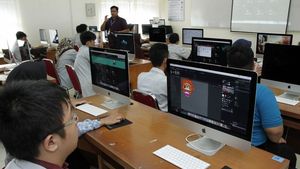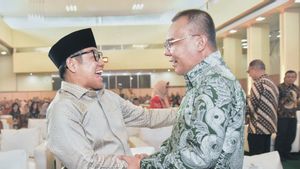
JAKARTA - There is an interesting story witnessed by millions of viewers throughout the country at the 77th Independence Day Commemoration of the Republic of Indonesia on Wednesday, August 18. At that time, the Merdeka Palace was swayed by the chanting of the song Ojo Dibandingke by a child singer from Banyuwangi, Farel Prayoga in front of President Joko Widodo.
All ceremony participants consisting of high-ranking agencies, ministers, and public figures dissolved in the chanting of the song and danced near the stage. However, what attracted the attention of screen viewers and netizens was the sign language interpreter (JBI), Winda Utami who interpreted the song.
Winda stole the attention because of how he interpreted the song passionately while swaying, so that deaf viewers could enjoy it.
The way of translating the song for ordinary people is perhaps something that is not commonly seen in formal events. Comments from netizens also vary, some find it funny to very expressive.
However, according to Winda, such a method is needed so that deaf people can understand the situation.
The woman who has studied Indonesian sign language (Bisindo) since 2011 explained that in sign language, there are three most important things, namely signs, expressions, and verbals. JBI in its delivery needs to describe the situation in the event with body movements.
In terms of music, Winda interprets by suggesting each musical instrument used, as well as the atmosphere that occurs to be understood by deaf viewers.
"The problem with the rocking dance is that it's just a reflex, because I described the situation the song is for a good dance. Moreover, the ministers were smiling and dancing there. So if I'm stiff, just keep quiet, then the situation will be 'what's going on?' It's weird," said Winda, quoted from ANTARA, Saturday, August 20.
It was different when Winda had interpreted the songs of the Indonesian band, GIGI. The rock music performed by the band is loud, so he doesn't have to dance to make deaf viewers understand.
Winda, who is a member of the Indonesian Sign Language Interpreter (INASLI) admits that being JBI at the 77th Anniversary of the Republic of Indonesia is the first time, after having appeared in official government events, institutions and news programs on television.
The interpretation of the song Ojo Dibandingke was done with spontaneity. The Javanese song was interpreted by Winda into Bisindo so that it could be understood.
Bisindo is not like Indonesian in general which has a SPOK pattern (Subject, Predicate, Object, and Description). Winda said in Bisindo, the object comes first.
For example, in Wong's lyric, why are you comparing ojok (people like this should not be compared). In Bisindo, it will be interpreted "People like this are compared, don't."
Previously, Winda never even imagined that he would interpret the song, because it was not in the rundown of the event. At first, Winda was surprised after seeing Farel preparing to sing and in a live broadcast.
However, Winda tried to be calm and confident that she could translate the Javanese song into sign language. Winda at least understands Javanese because she has lived in Solo. "So, in the song, I tried to follow Bisindo's structure, but still enjoyed the song," he said.
Many of the social media accounts re-uploaded the video of Winda interpreting the song Ojo Dibandingke. In fact, there was also an invitation to make Winda's movement viral as a dance cover for the song.
Winda responded casually. He invites netizens who appreciate the way he interprets the song Ojo Dibandingke to learn his movements so that they can be understood by deaf people.
It is hoped that with the popularity of her video, Winda can invite the public to be more interested in communicating with deaf friends.
Communicating with deaf people does not have to use sign language, but also verbally by removing masks and speaking slowly to deaf people, or using writing typed on a cellphone.
"Don't be afraid to communicate with a deaf friend, if you want to learn basic communication sign language, it's even better," said Winda.
In her heart, Winda also puts hope in the entertainment world in the country so that it can expand access for the deaf. For example, by providing text on Indonesian films.
Many deaf people are reluctant to watch Indonesian films because of the lack of Indonesian subtitles.
In addition, he hopes that concerts in Indonesia can provide JBI such as concerts abroad that have reached awareness for disability access.
Winda continues to study Bisindo to this day. He first learned about Bisindo in 2011, when he was mostly involved in the Welfare Movement for the Indonesian Deaf in Surakarta, Central Java.
For years, JBI's activities have only revolved around volunteerism and the community, until finally 2017 marked the beginning of his career as a JBI in Jakarta.
Until now, Winda continues to study at the official sign language institution Lintas.id to understand the basics of sign language structure.
“Because I used to be self-taught, like I knew how to communicate, but didn't know how to base literacy. I'm really learning now and Alhamdulillah it's really useful," he said.
A little story from the sign language interpreter (JBI), Winda Utami, this of course can be a lesson for us. Whatever work we do, if we do it wholeheartedly, it will give benefits and joy to others.
The English, Chinese, Japanese, Arabic, and French versions are automatically generated by the AI. So there may still be inaccuracies in translating, please always see Indonesian as our main language. (system supported by DigitalSiber.id)












